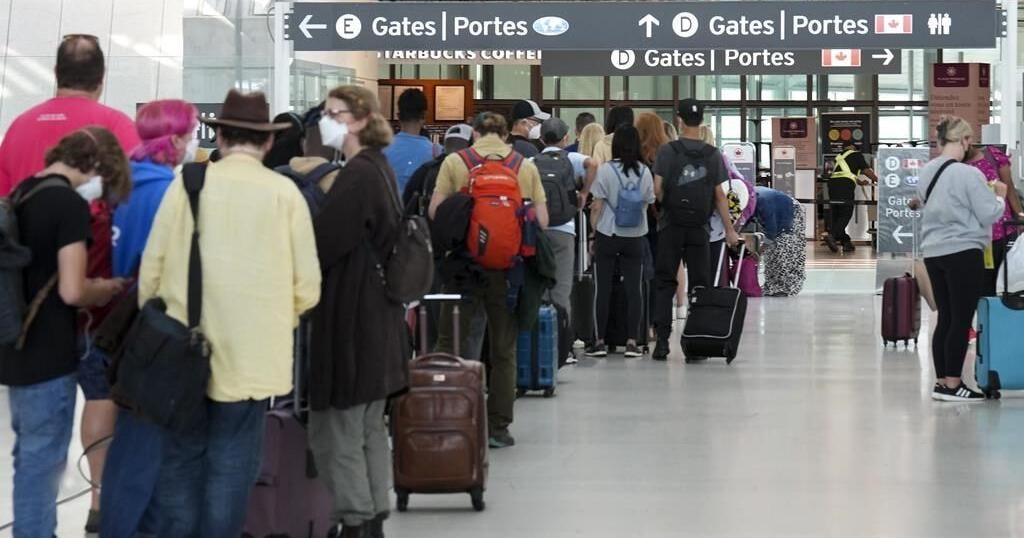MONTREAL – In a victory for air travellers, the Supreme Court of Canada has upheld rules that bolster compensation for passengers subjected to delays and damaged luggage on international flights.
On Friday, the country’s highest court unanimously dismissed an appeal by a group of airlines that challenged Canada’s passenger rights charter.
Air Canada, Porter Airlines Inc. and 16 other appellants had argued that the Air Passenger Protection Regulations launched in 2019 violate global standards and should be rendered invalid for trips into and out of the country.
The legal challenge, which kicked off that year, said that by imposing heftier compensation requirements for lost baggage and late or cancelled flights abroad, the regulations exceeded the Canadian Transportation Agency’s authority and breach international rules known as the Montreal Convention.
In December, the Federal Court of Appeal dismissed the carriers’ case, with the exception of one regulation that applies to the temporary loss of baggage.
The Canadian Transportation Agency and attorney general argued there is no clash between passenger protections and the Montreal Convention, a multilateral treaty signed by Canada in 2001.
On Friday, the Supreme Court effectively agreed, stating in a decision written by Justice Malcolm Rowe that the regulations “do not conflict with the Montreal Convention.”
Under the federal rules, passengers must be compensated with up to $2,400 if they were denied boarding because a trip was overbooked — so-called flight bumping. Delays and other payments for cancelled flights warrant compensation of up to $1,000.
Travellers can receive up to about $2,300 for lost or damaged baggage, though the exact number fluctuates based on exchange rates.
The airlines’ argument that the regulations contravene the Montreal Convention rested on that agreement’s “exclusivity principle.” The convention states that any “action for damages” — a lawsuit seeking financial compensation, for example — relating to an international flight is subject exclusively to the conditions of the treaty, rather than any other set of rules.
However, the court found that while actions for damages are pursued case by case, Canada’s passenger rights charter lays out a blanket approach and thus falls outside the Montreal Convention.
“The regulations do not provide for an ‘action for damages’ because they do not provide for individualized compensation; rather, they create a consumer protection scheme that operates in parallel with the Montreal Convention,” Rowe wrote.
“Accordingly, they do not fall within the scope of the Montreal Convention’s exclusivity principle.”
Since the rules came into force five years ago, the government has taken further steps to tighten them, a move prompted by scenes of airport chaos, endless security lines and overflowing baggage halls in 2022 during a surge in air travel after COVID-19-related shutdowns.
In 2023, it amended the law to close loopholes that have allowed airlines to avoid paying customers compensation and worked to establish a more streamlined complaints resolution system.
The new provisions also sought to ratchet up penalties via a $250,000 maximum fine for airline violations — a tenfold increase from the previous regulations — in an effort to encourage compliance.
Another amendment — both have yet to take effect — would place the regulatory cost of complaints on carriers’ shoulders. The measure, which would cost airlines $790 per complaint under a recent proposal from the regulator, aims to encourage them to brush up their service and thus reduce the number of grievances against them.
Meanwhile, the complaints backlog at the country’s transport regulator continues to mount, standing at about 78,000 as of last month.
Gabor Lukacs, president of the Air Passenger Rights advocacy group and an intervener in the case, said the Supreme Court ruling “breathes new life” into the move to revamp the traveller protection regime.
“The decision upholds Canadian passengers’ right to be treated fairly,” he said in a release.
However, the existing regulations fall short of the European Union’s “gold standard of passenger protection,” he added, calling for reforms that mirror EU rules.
This report by The Canadian Press was first published Oct. 4, 2024.
Companies in this story: (TSX:AC)

























